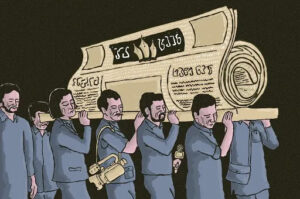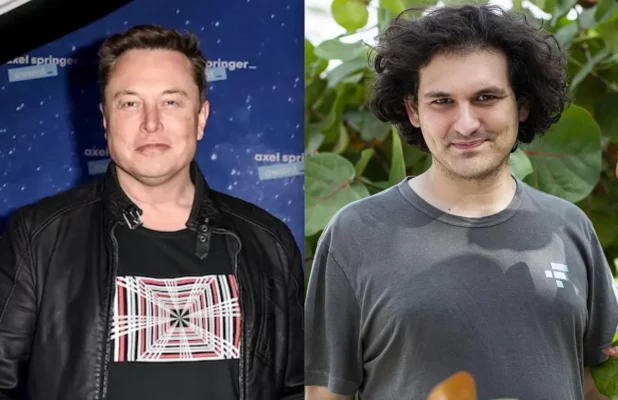
Disappearing media
This is the 199th edition of SHuSH, the official newsletter of the Sutherland House Inc.

This is the 195th edition of SHuSH, the official newsletter of The Sutherland House Inc. If you’re new here, hit the button:

We’re in for a fascinating battle of business biographies this autumn. In the red corner: Walter Isaacson’s Elon Musk. In the blue corner: Michael Lewis’s Going Infinite: The Rise and Fall of a New Tycoon, about disgraced crypto-king Sam Bankman-Fried. They will be released within a few weeks of each other, Isaacson by Simon & Schuster on September 12, Lewis by Norton on October 3. It doesn’t get more heavyweight than this.
Let’s start with the authors. Isaacson is a Harvard-educated Rhodes scholar who edited Time magazine at the turn of the century. He later ran the Aspen Institute, a non-partisan think tank, while producing a string of big biographies: Benjamin Franklin(2003), Einstein (2008), Steve Jobs (2011), and Leonardo da Vinci (2017). The Jobs and Da Vinci books were both number-one nonfiction bestsellers, as was his more recent The Code Breaker: Jennifer Doudna, Gene Editing, and the Future of the Human Race (2021).
Michael Lewis, Princeton and the London School of Economics, was still in his twenties when Liar’s Poker (1989), his quasi-memoir of his short career as a bond salesman at Salomon Brothers, caught fire. It has sold over a million copies and is still one of the most popular business books ever published. Lewis has now written about twenty books including Moneyball, The Blind Side, and The Big Short, all of which were bestsellers made into Hollywood films starring the likes of Brad Pitt (twice), Sandra Bullock, and Christian Bale.
Isaacson and Lewis are both very good at what they do. Isaacson’s books have strong science/tech angles and tend to be reverent variations on the theme of American Greatness (or, in Da Vinci’s case, High Renaissance Greatness). He is disinclined to show his subjects in unsympathetic light—just enough to make them relatable. Lewis concentrates on sports and money. His stock in trade is the brilliant outsider who out-thinks a corrupt or complacent system. For my money, Lewis is the better writer and storyteller as well as the shrewder cultural critic.
Each, at this moment, is as lucky as a writer can get in that his new subject blew up mid-project.
Isaacson says he wanted to write about Musk because of his roles in two of the most interesting projects of our time: the development of the electric car at his company Tesla and the private-sector rejuvenation of the American space program through his other company SpaceX. For those achievements, Isaacson’s old magazine named Musk its Person of the Year in 2021. More recently, Musk purchased Twitter in a deal that put his politics, personal values, and idiosyncratic behaviour on full display. Now, in addition to being one of the two or three richest people on the planet, he’s also one of the most controversial.
The author spent two years following Musk around. “It’s almost like Boswell got to do with Dr. Johnson,” he says, inviting ridiculous expectations for both of them. “I think I’ve had more access than anybody we know to the most interesting person possible. I’ve had more access than anybody’s ever had to a biography subject.”
I wonder if he remembers that Paula Broadwell was sleeping with her subject, General David Petraeus.
Isaacson’s recent interview about his book with the journalist and podcaster Kara Swisher did not go well. He wanted to talk about Musk saving the world by electrifying automobiles and aspiring to make humans a multi-planetary species. She wanted to talk about an “enormous narcissist” with poor impulse control who’d been tweeting “homophobic, misogynist, and racially insensitive” comments and cruelly mocking a person with muscular dystrophy.
But he’s a genius, said Isaacson.
And you’re an enabler, said Swisher.
It’s worth a read.
I expect the hate Musk is attracting will only boost Isaacson’s sales and that the book will disappoint those who share it. Isaacson being Isaacson, he’s bringing the Heroic Elon Musk.
Michael Lewis says he met Sam Bankman-Fried, the young founder of the cryptocurrency exchange FTX, two years ago at the suggestion of a friend who was about to do business with the company. They went on a hike together, after which Lewis apparently told Bankman-Fried: “I don’t know what’s going to happen to you, but I just want to watch.”
Lewis had a front-row seat as the big-haired and slovenly crypto trader, Democratic party donor, and evangelist for an appealing but vague concept called effective altruism (he was earning money to give it away at some undetermined future point)—saw his personal fortune peak at $26 billion. He was still on the scene last autumn when Bankman-Fried crashed FTX and 130 associated legal entities. The “new tycoon” was arrested at his luxury apartment in the Bahamas, part of a $250 million (US) real estate portfolio amassed by the altruist and his pill-popping, polyamorous associates. He is now charged with wire fraud, commodities fraud, securities fraud, money laundering, and breaches of campaign finance law and if convicted faces 115 years in prison.
Lewis says he knew he’d hit the jackpot the moment things started to go south: “I hate to say this. It’s horrible. It does not reflect well on me as a human being, but my first thought was, ‘Oh my God’—it was like a lock clicking into place—‘now I have a story.’”
Two weeks ago, he gloated to The Guardian that Bankman-Fried “let me see everything. When it all comes crashing down last November, it’s literally me, his parents and his therapist. And I can hang around as long as I want, see whatever I want. And this is the other odd thing. Not only has he never sought to control anything I think, or anything I might write, he’s never even asked: what are you doing? He’s just allowed me freedom, a freedom which is really unusual, especially given the circumstances…. It’s almost as if I was attached to a character who was insistent on generating a beautiful work of fiction for me in real time, in the real world, and allowing me to watch.”
Lewis continues to enjoy full access to the now busted (in every sense of the word) Bankman-Fried as he awaits trial at his parent’s house in Palo Alto. More gloating in the New York Times: “[Bankman-Fried] is the ideal subject. He’s locked up in his house an hour from my house with an ankle monitor. He can’t go anywhere. It’s unbelievably convenient, as long as they keep him there. So, as long as he welcomes me into the house, it’s fine. I’ve been seeing him roughly every two weeks.”
What does Lewis really think of this character? He’s not saying beyond that this is “the first time I’ve had a protagonist who the reader won’t trust, or who they will come to the story with lots of baggage about.” He intends to put the reader in the position of a juror in the fallen tycoon’s forthcoming trial.
Something to watch as these books hit the market is the degree to which the authors are implicated in their stories. Unusual access can have its price. Kara Swisher headed in this direction when she accused Isaacson of enabling Musk and fuelling his narcissism.
People are bound to notice irregularities in Michael Lewis’s story about the origins of his project. His connection to Bankman-Fried appears to have been Brad Katsuyama, hero of Lewis’s bestselling Flash Boys, about an iconoclastic genius who was exposing the rigged game of US stock markets. Before police swooped in, Lewis was tellingpeople (without naming Bankman-Fried) that his next book was about a brilliant outsider using crypto to upend a decrepit banking system. Lewis is now making it sound as though he was always non-committal on SBF—“I don’t know what’s going to happen to you”—but it didn’t start that way. There is year-old video online of Lewis hosting a fancy Bahamian panel discussion at which a very jittery Bankman-Fried touted the wonders of FTX and cryptocurrencies (SBF has the same tic as Bill Gates, furiously tapping his foot as he speaks).
A handful of FTX’s paid celebrity endorsers, including Larry David, Tom Brady, Shaquille O’Neal and Steph Curry, are now embroiled in class action suits brought by people who were burned by the currency exchange. I expect Lewis was smart enough not to have taken money but he certainly contributed to inflating the legend of Bankman-Fried and making suckers of those same people.
Incidentally, one of the subjects Lewis and SBF discussed on that panel? Why it was a great idea for Elon Musk to buy Twitter.
A weekly newsletter like SHuSH is a lot of work. We don’t charge for it or present advertising or ask for donations, but that doesn’t mean we wouldn’t appreciate a little support. The best way you could help keep us going is to subscribe to our Sutherland Quarterly.
The second edition of Sutherland Quarterly is now available for order. From the inimitable author and journalist Paul Wells, An Emergency in Ottawa: The Story of the Convoy Commission:
On Feb 14, 2022, Prime Minister Justin Trudeau made what might be the most controversial decision of his tenure, invoking the Emergencies Act to end a three-week occupation of downtown Ottawa by truckers protesting mandatory COVID-19 vaccine mandates. Proclaimed in 1988, the Emergencies Act is designed to give federal officials extraordinary powers in the event of threats to Canada\’s national security that can\’t be managed under existing laws. Trudeau used it to make the protest illegal, freeze the accounts and cancel the vehicle insurance of participants, requisition tow trucks to clear protestors from the streets, among other measures. The government defended the first-ever invocation of the act as just and necessary; several premiers and the Canadian Civil Liberties Association called it an assault on democratic rights and civil liberties. As required by the act, Trudeau appointed a commission of inquiry into its use. Last November, justice Paul Rouleau held three weeks of riveting hearings that included testimony by so-called Freedom Convoy organizers, police officials, cabinet ministers, and Trudeau himself. Award-winning author Paul Wells was a regular visitor to the inquiry. Witnesses described layer on layer of dysfunction and acrimony in every organization that converged on Parliament Hill—three levels of government, three police forces, and the protesters themselves. How does a society make crucial decisions when everyone is exhausted, nothing works, and the noise from the truck horns and the shouting is deafening? And how do the protagonists regroup to make their case in the weird and sterile environment of a public inquiry? That\’s the story-inside-a-story of the Emergency in Ottawa.
Launched last fall, Sutherland Quarterly is a new series of captivating essays on current affairs by some of Canada’s best writers. Each essay will be published as a stand-alone book and sold at retail in the usual manner; the essays will also be available (at a preferred price) by annual subscription. An Emergency in Ottawa will hit stores in early April, $19.95 (plus HST); the subscription price is 20 percent off the cover price or $67.99 (including HST). I hope you’ll consider subscribing.
Also, we are open to submissions.

This is the 199th edition of SHuSH, the official newsletter of the Sutherland House Inc.

There was an interesting piece in the New York Times a week or so ago about James Daunt (above), the incoming chief executive of Barnes & Noble, the most important bookstore chain in the English-speaking world. It didn’t quite get to the nub of the matter. Barnes & Noble has

The world of non-fiction from Sutherland House ( and Beyond )